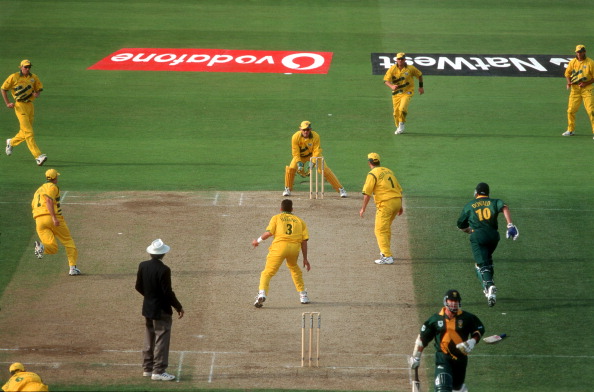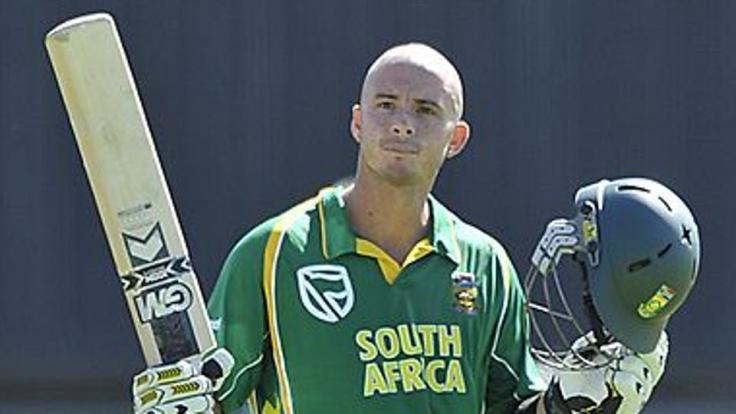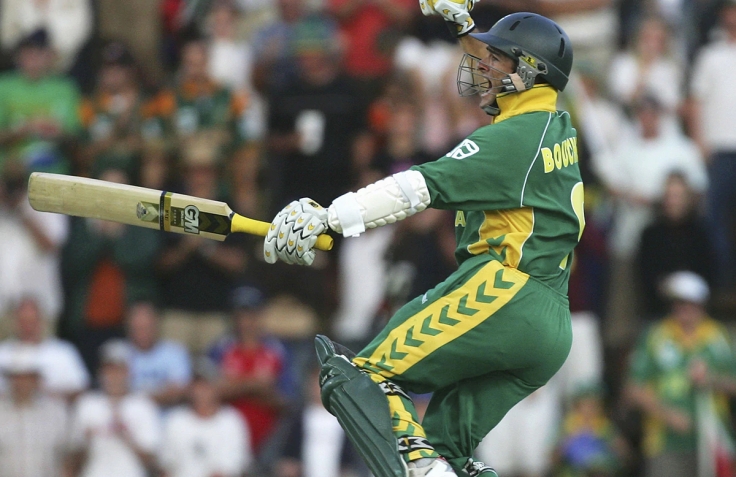“Look at the tears! They are crying out there. The South Africans are charging onto the ground. Gilchrist shakes hands with Boucher. Ntini is on a high. Ponting cannot believe this has happened to his team. The South Africans at the Bull Ring today have seen the greatest One-Day International ever played.”

June 17, 1999: South Africa need 9 runs from the final over to secure a place in their first ever World Cup final. Lance Klusener, the player of the tournament, butchers the first two balls to the boundary. A tie was not enough. South Africa had to win to progress into the final. Then came the brain-fade, a concept less prevalent and heard of compared to today. Allan Donald, wandering as if in the lawns of his home, backed up too far, only to find him and Klusener at the same end. No amount of white lightening helped him get back into the crease. If the 1992 semi-final was heart-breaking, this crushed their soul. The Proteas earned themselves the ‘chokers’ tag, something they have not managed to rid themselves off till date.

March 12, 2006: Nearly seven years after the trauma of Edgbaston, the Proteas took on the Aussies in an ODI series at home. The five-match series was tied at 2-2 with the decider to be played at the Wanderers in Johannesburg. During these seven years, the South Africans did all they could to justify their ‘chokers’ tag. Whether it was the Champions Trophy clash against India in 2002 where they snatched defeat from the jaws of victory, or a terrible calculation error that saw them being knocked out of the 2003 World Cup in front of their home crowd, the Proteas never lost, they ‘choked.’
Taking advantage of the flattest pitch on offer at the Bull Ring, Ricky Ponting dished out an action replay of his knock in the 2003 World Cup final against India at the same venue, smashing his way to 164. Contributions from Katich, Gilchrist and Hussey propelled the visitors to a gigantic 434.
The highest total ever chased thus far in ODIs was when Australia managed to chase 330 against the Proteas at Port Elizabeth in 2002. The Aussies always believed that they would win. For them, it was a matter of how soon and by how much? Boeta Dippenaar’s broken off-stump in the second over of the chase, accentuated that belief. Herschelle Gibbs, along with his skipper Greame Smith walloped their way to adding 187 runs in just under 21 overs before Smith fell to Michael Clarke, possibly Australia’s best left-arm spinner ever, for a 55-ball 90.
Gibbs, batting on 84 at the fall of Smith, scored his century, scored 150 and got to 161 before AB De Villiers fell with the score at 284. De Villiers’ contribution in the 94-run partnership: 14. Gibbs reached 175, displaying an array of strokes with no corner of the ground being spared. Debutant Mick Lewis was accorded special treatment, so much so that he never played an international game thereafter. A mistimed loft of the bowling of Symonds saw the end of Gibbs’ knock. It went down as one of the greatest innings in a run chase before Virat Kohli began doing it as a hobby. At 299 for 4, South Africa had the required rate under control but needed somebody to play through the 50-overs.

Jacques Kallis and Justin Kemp contributed a few but couldn’t convert their starts into big ones. At 358 for 6, South Africa needed 77 of the last seven overs. Australia knew that two good overs would put the game into their kitty. But the two overs were never to be found. Ponting kept persisting with the debutant Lewis who kept discovering new corners of the ground to be hit. At the end of his spell, his figures read 10-0-113-0, a dubious record he still carries on his back. Van der Wath fell for a precious 18-ball 35, the strike rate accounting for gold dust when his team needed 11 runs an over.
The crowd has sensed something special was in the offing. Every run scored was cheered with equal enthusiasm. Van der Wath was given a standing ovation as he left the field. Nobody at the ground sat for the final few minutes of this nail-biter.
“A roar goes up as Telemachus strides onto the ground. They weren’t exactly roaring when he was bowling. This place was as quiet as a mouse.”
While cameos kept coming from the other end, one man held the innings together like he did so often for his side – Mark Boucher. Ones were turned into twos while the odd boundary decorated the over. Telemachus showcased some muscle for his 12 before Mike Hussey dived for his life to cut his innings short.
South Africa needed nine off the last over in 1999. They needed seven here. Brett Lee stopped a rocket from Boucher off his own bowling to keep it down to a single. 6 needed off 5. Andrew Hall hoicks one over the infield and brought the gap down to 2 off 4. He attempted an encore only to hit it down the throat of Clarke at mid-on.
The ghosts of Edgbaston were sneaking through the door yet again. Makhaya Ntini sprinted onto the pitch, possibly cursing Hall for the terrible shot that he played. The noise was defeaning. The pulse was racing, Ntini’s the fastest. A Yorker from Lee would have been game over, but that was not to be. In what would have been the most important single of his life, Ntini guided one down to third man and sprinted faster than Usain Bolt. The scores were level. Boucher had played a Klusener-like knock. All he wanted was for Ntini to not do a Donald.
An attempted Yorker from Lee saw Boucher reprising Hall’s attempted hoick that led to his downfall. Only difference being that this came right off the middle of the bat and crashed into the advertising hoardings. The game was won. The ghosts of Edgbaston were exorcised. The team charged onto the field. The crowd was on its feet. The Aussies were dejected. The ‘chokers’ tag was shed for once and self-belief was born.

“Look at the tears! They are crying out there. The South Africans are charging onto the ground. Gilchrist shakes hands with Boucher. Ntini is on a high. Ponting cannot believe this has happened to his team. The South Africans at the Bull Ring today have seen the greatest One-Day International ever played.”
There could not have been a more apt summation of this game by the legendary Late Tony Greig. The underdog had won. Hope had won. March 12, 2006 will go down as the greatest day in the history of South African cricket until they win an ICC tournament. The greatest ODI ever played gave every cricket fan across the globe, a story to remember!
Leave a comment